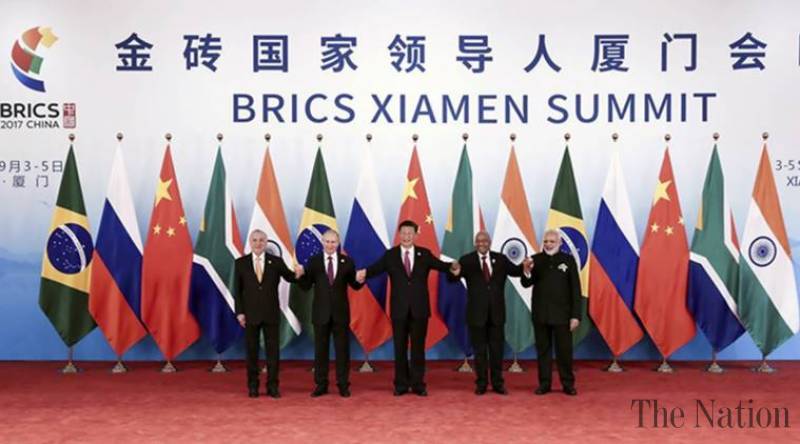The BRICS Declaration, among a host of issues, mainly focused on opposition to protectionism, denouncing North Korea’s latest nuclear test, tougher measures against terrorist groups and the UN reforms. It is however the naming of the terrorist outfits in the declaration that is being commented upon in the Pakistani media and the intellectual circles. There has been too much reading between the lines and drawing of out-of-context inferences.
A headline in a National English daily said “BRICS concerned over terror outfits in Pakistan” Some commentators have called the development a failure of Pakistan’s foreign policy and some even went to the extent of saying that it was for the first time Pakistan’s all weather friend has explicitly called out militant groups in the country—and tacitly Pakistan as well and the declaration has played into India’s narrative against Pakistan.
I have read the paragraphs 47-51 of the declaration that deal with the phenomenon of terrorism several times and found nothing which could be construed as an indictment of Pakistan and endorsement of the Indian narrative against it. In paragraph 47 the declaration condemns the terrorist attacks in Afghanistan and extends support for peace initiatives that can help to bring peace in the country; a position very much supported by Pakistan. In the paragraph 48 concern has been expressed on the security situation in the region and violence caused by Taliban ISIL/DAISH, Al-Qaida and its affiliates including Eastern Turkistan Islamic Movement, Islamic Movement of Uzbekistan, the Haqqani network, Lashkar-e-Taiba, Jaish-e-Mohammad, TTP and Hizb ut-Tahrir. This is the paragraph which is actually the subject of all sorts of comments. It does not talk about safe havens in Pakistan as is being claimed. It talks in general terms about terrorism in the region and the entities involved in carrying it out. Pakistan also condemns terrorism in all its manifestations and considers all these organisations as terrorist outfits. There is no clash of views on their role as terrorist entities.
Paragraph 49 says: “We deplore all terrorist attacks worldwide, including attacks in BRICS countries, and condemn terrorism in all its forms and manifestations wherever committed and by whomsoever and stress that there can be no justification whatsoever for any act of terrorism. We reaffirm that those responsible for committing, organizing, or supporting terrorist acts must be held accountable. Recalling the primary leading role and responsibility of states in preventing and countering terrorism, we stress the necessity to develop international cooperation, in accordance with the principles of international law, including that of sovereign equality of states and non-interference in their internal affairs. We reaffirm solidarity and resolve in the fight against terrorism, value the 2nd BRICS Counter-Terrorism Working Group Meeting held in Beijing on 18 May 2017, and agree to strengthen our cooperation.” There is a condemnation of acts of terrorism wherever they occur and whosoever commits them. Recalling the responsibility of every state to prevent terrorism it calls for holding accountable those who commit, organise or support terrorist acts. Here again no names have been named. The declaration talks about terrorism on the global level and condemns it out rightly no matter who commits it and wherever it happens. It surely has a wider meaning than our media and intellectuals are trying to interpret. It is really strange that in spite of there being no mention of safe havens in the declaration we keep insisting on it while interpreting it. When the declaration says it condemns terrorism wherever it occurs it can also be interpreted as pertaining to terrorist attacks occurring in Pakistan by the same logic. The fact is that the declaration talks in general terms and has not targeted Pakistan as such.
In my view the declaration has been totally misunderstood and misinterpreted by certain circles of the media and the intellectual circles as well as some politicians. The insinuation about China having changed her stance in this regard is also very misleading.
The most prudent and correct assessment of the declaration has come from none other than the Foreign Minister Khawaja Asif who talking to a private Channel dismissed the notion that the declaration was against Pakistan and that it represented failure of Pakistan’s foreign policy saying “I do not get why people are so surprised over the terrorist names included in the BRICS Declaration. These organisations are also banned in Pakistan. The BRICS declaration which named terrorist groups in South Asia region cannot be termed as failure of country’s foreign policy.” The Minister nevertheless accepted that Pakistan had make some mistakes in the past as the country should not have participated in the proxy war in Afghanistan as well as the war on terror. He said, “We need to erase our false image. We have no stake but here is a baggage. We need to accept history and correct ourselves.” The Minister probably also emphasised the need for a new foreign policy in the same context and the changed regional situation.
The envoys moot has also been convened in Islamabad to discuss the situation in the backdrop of the announcement of US policy on Afghanistan and South Asia and other regional development in which an exhaustive review of the existing policy will be made and necessary adjustment required to be effected to realign it with the emerging realities, will be deliberated upon. It is a timely initiative. Pakistan does need a review of its past policies and present its real and changed face to the international community, based on its efforts to fight the scourge of terrorism and the unparalleled sacrifices and sufferings that it had to endure.
It is said that the worth of a nation in managing international affairs is inextricably linked to its internal unity, economic and military strength. All our efforts must therefore be geared to making Pakistan strong in these areas so that its voice has a value and is heard on the global level. There is no escape from this reality.






